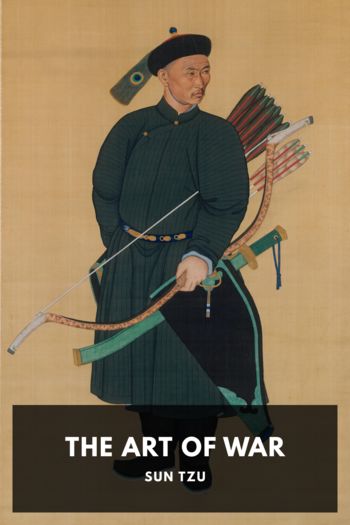The Art of War, Sun Tzu [best english books to read for beginners TXT] 📗

- Author: Sun Tzu
Book online «The Art of War, Sun Tzu [best english books to read for beginners TXT] 📗». Author Sun Tzu
Tu Mu says: “In the enemy’s country, win people over by kind treatment, and use them as spies.” ↩
官 includes both civil and military officials. Tu Mu enumerates the following classes as likely to do good service in this respect: “Worthy men who have been degraded from office, criminals who have undergone punishment; also favourite concubines who are greedy for gold, men who are aggrieved at being in subordinate positions, or who have been passed over in the distribution of posts, others who are anxious that their side should be defeated in order that they may have a chance of displaying their ability and talents, fickle turncoats who always want to have a foot in each boat (飜覆變詐常持兩端之心者). Officials of these several kinds,” he continues, “should be secretly approached and bound to one’s interests by means of rich presents. In this way you will be able to find out the state of affairs in the enemy’s country, ascertain the plans that are being formed against you, and moreover disturb the harmony and create a breach between the sovereign and his ministers.” The necessity for extreme caution, however, in dealing with “inward spies,” appears from an historical incident related by Ho Shih: “羅尚 Lo Shang, Governor of 益州 I-chou, sent his general 隗伯 Wei Po to attach the rebel 李雄 Li Hsiung of 蜀 Shu in his stronghold at 郫 Pʽi. After each side had experienced a number of victories and defeats, Li Hsiung had recourse to the services of a certain 朴泰 Pʽo-tʽai, a native of 武都 Wu-tu. He began by having him whipped until the blood came, and then sent him off to Lo Shang, whom he was to delude by offering to cooperate with him from inside the city, and to give a fire signal at the right moment for making a general assault. Lo Shang, confiding in these promises, marched out all his best troops, and placed Wei Po and others at their head with orders to attack at Pʽo-tʽai’s bidding. Meanwhile, Li Hsiung’s general, 李驤 Li Hsiang, had prepared an ambuscade on their line of march; and Pʽo-tʽai, having reared long scaling-ladders against the city walls, now lighted the beacon-fire. Wei Po’s men raced up on seeing the signal and began climbing the ladders as fast as they could, while othere were drawn up by ropes lowered from above. More than a hundred of Lo Shang’s soldiers entered the city in this way, every one of whom was forthwith beheaded. Li Hsiung then charged with all his forces, both inside and outside the city, and routed the enemy completely.” (This happened in 303 AD. I do not know where Ho Shih got the story from. It is not given in the biography of Li Hsiung or that of his father Li 特 Tʽê, Chin Shu, ch. 120, 121.) ↩
By means of heavy bribes and liberal promises detaching them from the enemy’s service, and inducing them to carry back false information as well as to spy in turn on their own countrymen. Thus Tu Yu: 因厚賂重許反使為我間也. On the other hand, 蕭世諴 Hsiao Shih-hsien in defining the 反間 says that we pretend not to have detected him, but contrive to let him carry away a false impression of what is going on (敵使人來候我我佯不知而示以虛事). Several of the commentators accept this as an alternative definition; but that it is not what Sun Tzǔ meant is conclusively proved by his subsequent remarks about treating the converted spy generously (“The enemy’s spies …” sqq.). Ho Shih notes three occasions on which converted spies were used with conspicuous success: 1) by Tʽien Tan in his defence of Chi-mo (see supra, note 475); 2) by Chao Shê on his march to O-yü (see note 349); and by the wily 范雎 Fan Chü in 260 BC, when Lien Pʽo was conducting a defensive campaign against Chʽin. The King of Chao strongly disapproved of Lien Pʽo’s cautious and dilatory methods, which had been unable to avert a series of minor disasters, and therefore lent a ready ear to the reports of his spies, who had secretly gone over to the enemy and were already in Fan Chü’s pay. They said: “The only thing which causes Chʽin anxiety is lest 趙括 Chao Kua should be made general. Lien Pʽo they consider an easy opponent, who is sure to be vanquished in the long run.” Now this Chao Kua was a son of the famous Chao Shê. From his boyhood, he had been wholly engrossed in the study of war and military matters, until at last he came to believe that there was no commander in the whole Empire who could stand against him. His father was much disquieted by this overweening conceit, and the flippancy with which he spoke of such a serious thing as war, and solemnly declared that if ever Kua was appointed general, he would bring ruin on the armies of Chao. This was the man who, in spite of earnest protests from his own mother and the veteran statesman 藺相如 Lin Hsiang-ju, was now sent to succeed





Comments (0)